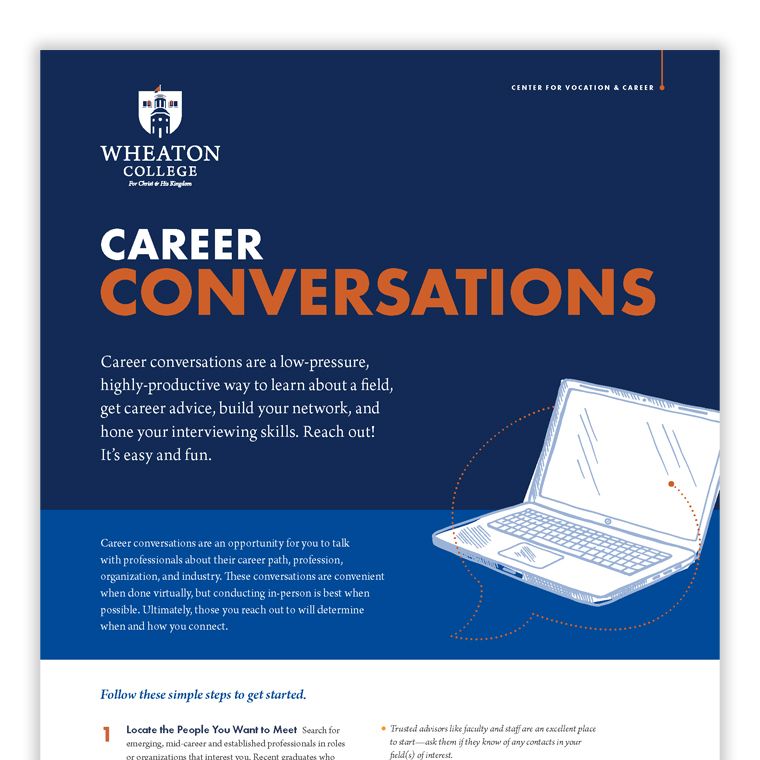Career conversations are a low-pressure, highly-productive way to learn about a field, get career advice, build your network, and hone your interviewing skills. Reach out! It’s easy and fun.
Career conversations are an opportunity for you to talk with professionals about their career path, profession, organization, and industry. These conversations are convenient when done virtually, but conducting in-person is best when possible. Ultimately, those you reach out to will determine when and how you connect.
Follow these simple steps to get started.
Locate the People You Want to Meet
Search for emerging, mid-career, and established professionals in roles or organizations that interest you. Recent graduates who are emerging in their careers have firsthand knowledge about existing pathways. Mid-level and advanced professionals have large networks and can share their views about how industries are changing.
- Start by targeting Wheaton alumni on LinkedIn. Many of our alumni are kind and generous toward Wheaties who reach out!
- Trusted advisors like faculty and staff are an excellent place to start—ask them if they know of any contacts in your field(s) of interest.
- Consider family members, friends, and church members who you might learn from.
- Don’t be afraid to be bold—is there a well-known person in your field of interest whose perspective would be helpful, interesting or inspiring? Reach out to them! You have nothing to lose and much to gain—the worst that could happen is you get a “no.”
Make Contact
Send a brief message (via email or LinkedIn) asking for a career conversation.
- Be friendly and to the point. Make sure your request is reasonable—acknowledge their busy schedule, ask for about 20 minutes (this can easily expand to an hour once you meet), offer to meet at their convenience, including outside business hours such as early morning.
- Tap into your existing network by asking a mutual contact to send an email introduction first – go ahead and increase convenience by writing an email for your mutual contact to send. A call, text, or email introduction from a mutual contact like a Wheaton professor can increase the odds of scheduling a career conversation.
- Be appropriately persistent. Don’t expect a return call or email, especially from the first contact. If you haven’t gotten a reply after three to five days, it’s completely appropriate to send a follow-up note. Remember, they’re busy!
“Hello, I noticed from your profile that you have experience in both local and national news coverage. As a fellow Wheatie, I'd love to hear about your career path and learn about what you wished you would've known at my age. I welcome the chance to connect, if you have 20 minutes in the next couple of weeks. Happy to meet for coffee, a phone call, or even over Zoom. Thanks for your time!”
Be Prepared
After scheduling a time to meet, prepare well. Don't ask questions you can easily answer with Google. Instead, ask well-informed questions about their role. Remember, people like to talk about themselves so this should be fun for both of you! Here are some questions to consider:
- What attracted you to this type of work?
- What are the most challenging and most rewarding aspects of your current role?
- What skills, qualities, and experiences does your employer seek in new hires?
- What trends are you seeing currently in your profession?
- Given what we have talked about today, are there other people you’d recommend I connect with?
Follow up with Thanks
A working professional who has taken the time to meet with you for a career conversation has done you a wonderful favor. Be sure to follow up with a prompt and heartfelt thanks in an email.
